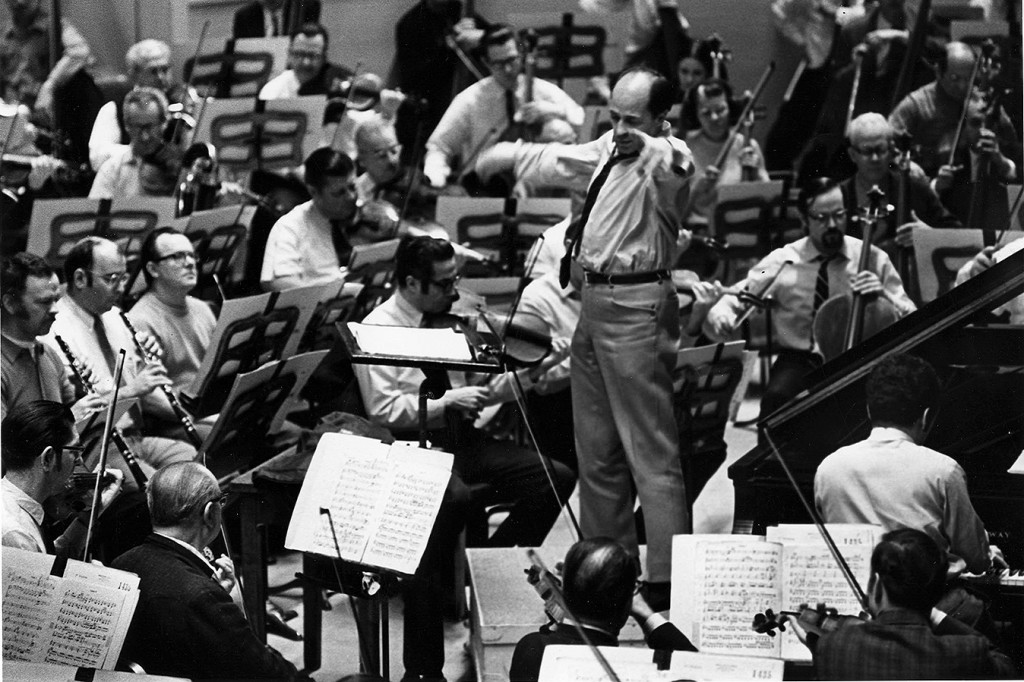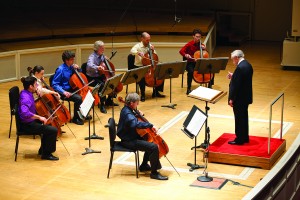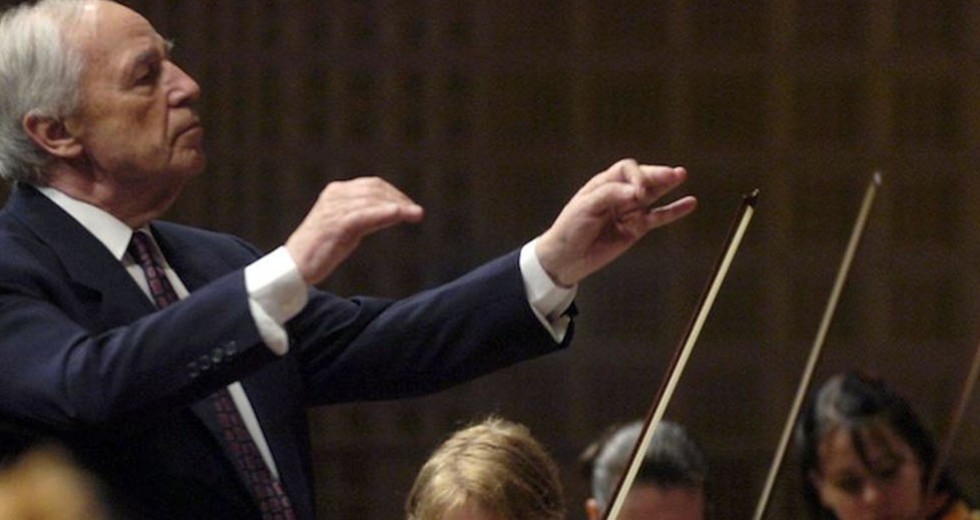
When Pierre Boulez first appeared with the Chicago Symphony Orchestra in 1969, he was famous as a revolutionary composer, and he already was building a reputation as an unusually insightful conductor. By the time he returned to the Chicago Symphony in 1987 and then began his annual residencies with the orchestra starting in 1991, he was acknowledged as one of the revelatory conductors of our time. Over his years with the CSO, Boulez transformed repertory standards, dusted off concert rarities and introduced works by then-unknown composers.
The following dates are among his many milestones in Chicago:
Feb. 20, 1969: Pierre Boulez makes his Chicago Symphony debut conducting Debussy’s Jeux, Webern’s Passacaglia and Six Pieces for Orchestra, Messiaen’s Et expect resurrectionem mortuorum and Bartók’s First Piano Concerto, with soloist Daniel Barenboim, in his CSO subscription concert debut.
Feb. 27-28, 1969: In Boulez’s second week conducting the CSO, he leads music by Haydn, Berg, Schumann (the Cello Concerto, with Jacqueline du Pré) and the U.S. premiere of his own composition, Livre pour cordes.
Feb. 20-21, 1986: Boulez and the Ensemble Intercontemporain, the resident ensemble of IRCAM in Paris, perform in Chicago on their first American tour: in Northwestern University’s Patten Gymnasium, Boulez leads his Répons, and the following night in Orchestra Hall, he conducts the Ensemble Intercontemporain in music by Varèse, Boulez, Dufourt, Carter and Schoenberg.
Oct. 22, 23 and 25, 1987: After an absence of nearly 19 years, Boulez returns to conduct the Chicago Symphony in Stravinsky’s Symphonies of Wind Instruments, Bartók’s The Wooden Prince and his own Notations I–IV.
May 9, 1991: Daniel Barenboim conducts the U.S. premiere of four movements from Boulez’s Le visage nuptial.
Dec. 8, 1991: Boulez speaks at the Art Institute on the subject of “On Classicism and Modernism,” and later that day, leads the Civic Orchestra of Chicago in an open rehearsal of Schoenberg’s Variations for Orchestra.
Nov. 22, 1992: Boulez leads the Civic Orchestra in an open rehearsal of Bartók’s Concerto for Orchestra.
Dec. 3, 1992: Leon Fleisher performs Ravel’s Piano Concerto for the Left Hand with the CSO under Boulez.
Dec. 2, 4 and 7, 1993: Boulez conducts Le tambourin, Suites 1 and 2, by Bernard Rands and a concert version of Bluebeard’s Castle by Béla Bartók featuring Jessye Norman and László Polgár.
March 1, 1994: Boulez’s CSO and Chorus recording of Bartók’s Cantata profana and The Wooden Prince wins three Grammy Awards, including Best Classical Album.
Nov. 25, 1994: Boulez leads a performance of Debussy’s First Rhapsody with CSO principal clarinet Larry Combs and Luciano Berio’s Sinfonia with the Swingle Singers.
Dec. 4, 1994: Boulez presents a lecture at the Art Institute titled “Score: Imagination and Reality.”
Dec. 8, 1994: Boulez conducts Mahler’s Seventh Symphony.
Dec. 15-17, 1994: Boulez conducts his own Le visage nuptial with the Women of the Chicago Symphony Chorus and soloists Laura Aikin and Lucy Shelton.
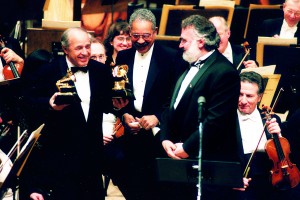
Pierre Boulez receives two Grammy Awards for his recording with the CSO of Bartok’s Concerto for Orchestra and Four Orchestral Pieces.
March 1, 1995: The Boulez and CSO recording of Bartók’s Concerto for Orchestra and Four Orchestral Pieces wins two Grammy Awards, including Best Classical Album.
March 26, 1995: On Boulez’s 70th birthday, CSO musicians perform Boulez’s Le marteau sans maître at the Art Institute of Chicago.
March 30, 1995: Boulez is named principal guest conductor of the Chicago Symphony. New works by four composers — Bernard Rands, Harrison Birtwistle, Franco Donatoni and Elliott Carter — are given their world premieres at an early evening concert honoring Boulez’s birthday. That evening’s CSO concert features Daniel Barenboim as soloist, with Boulez conducting, in Bartók’s First Piano Concerto, the work in which they first collaborated in Chicago.
May 31, 1995: Boulez joins the CSO on its Japan tour in a performance of music by Webern, Bartók (the First Concerto, with Barenboim), and Berio (Sinfonia) at Suntory Hall in Tokyo.
Dec. 14, 1995: The world premiere of Philippe Manoury’s Prelude and Wait is given by the CSO under Boulez.
Nov. 29, 1996: Baritone José van Dam sings Ravel and Mahler under Boulez; the program also includes Varèse’s Déserts and Messiaen’s L’ascension.
Dec. 8, 1996: In a lecture at the Art Institute, Boulez asks “Is There a Zeitgeist?”
Dec. 12, 1996: Boulez leads the world premiere of . . . words of the sea . . . by CSO composer-in-residence Augusta Read Thomas.
April 23, 1998: Boulez conducts John Bruce Yeh, assistant principal clarinet, and the CSO in Carter’s Clarinet Concerto.
April 30, 1998: Pierre-Laurent Aimard plays Ligeti’s Piano Concerto and Messiaen’s Oiseaux exotiques under Boulez.
Nov. 27, 1998: CSO composer-in-residence Augusta Read Thomas’ Orbital Beacons is given its world premiere by the CSO under Boulez.
Dec. 10, 1998: Gil Shaham is soloist in Bartók’s Second Violin Concerto under Boulez.
Jan. 14, 1999: Daniel Barenboim leads the Chicago Symphony in the world premiere of Boulez’s Notations VII for Orchestra, commissioned by the CSO.
Feb. 24, 1999: The Boulez and CSO recording of Mahler’s Ninth Symphony wins the 1998 Grammy Award for Best Orchestral Performance; their Bluebeard’s Castle wins the Grammy Award for Best Opera Recording.
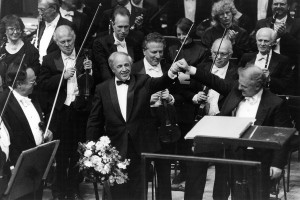
Daniel Barenboim (far right) joins the CSO in celebrating the 70th birthday of Pierre Boulez (center), who also was named principal guest conductor.
March 24 and 26, 1999: Boulez is at the helm of Schoenberg’s opera Moses and Aron, featuring more than a dozen soloists, the Chicago Symphony Chorus and the Chicago Children’s Choir.
April 1, 1999: The Berlin Festagge hosts a performance of Moses und Aron with Boulez and the CSO.
Nov. 26, 1999: Boulez leads the CSO in the world premiere of Philippe Manoury’s Sound and Fury, dedicated to Boulez in honor of his 75th birthday.
Nov. 29, 1999: As part of the new MusicNOW series, Boulez leads the Paris-based Ensemble Intercontemporain in a performance of his Sur Incises, plus music by Schoenberg and Berio.
Dec. 2, 3, 4, 5 and 7, 1999: Boulez conducts Bruckner for the first time in Chicago: Symphony No. 9.
April 25, 2000: Boulez conducts the CSO in a program of works by Berg, Debussy and Stravinsky at the Philharmonie in Cologne, during the orchestra’s Germany tour
Oct. 26, 27-28, 2000: With the CSO, Boulez conducts Bruckner’s Fifth Symphony for the first time in his career.
Nov. 2-4, 2000: Boulez leads Janáček’s Glagolitic Mass for the first time ever.
May 2, 2001: Mathieu Dufour, principal flute, performs Boulez’s Memoriale under the composer’s baton on the MusicNOW series.
May 3, 3001: Mitsuko Uchida joins Boulez and the CSO in a performance of Ravel’s Piano Concerto in G Major.
Nov. 8, 2001: The CSO and Boulez give the U.S. premiere of zeroPoints by Peter Eötvös.
Nov. 18, 2001: Boulez leads musicians from the CSO in his Dérive 1 at a MusicNOW concert.
Feb. 27, 2002: The Boulez and CSO recording of Varèse’s Amériques, Arcana, Déserts and Ionisation wins the 2001 Grammy Award for Best Orchestral Performance.
Dec. 1, 2002: A MusicNOW concert conducted by Boulez features the world premiere of Augusta Read Thomas’ In My Sky at Twilight and a performance of Boulez’s Anthèmes with CSO assistant concertmaster Yuan-Qing Yu.
Dec. 5-7, 2002: Daniel Barenboim at the piano joins Boulez and the CSO in Schoenberg’s Piano Concerto and Richard Strauss’ Burlesque.
Dec. 11-13, 2003: To honor the 200th anniversary of Berlioz’s birth, Boulez conducts the CSO and Chorus, along with guest soloists Michelle DeYoung, Matthew Polenzani and Robert Holl, in the composer’s Romeo and Juliet.
Feb. 3-4, 2005: Boulez joins pianist Daniel Barenboim in Bartók’s First Piano Concerto.
May 16, 2005: Boulez conducts Berg’s Chamber Concerto, with Daniel Barenboim and Pinchas Zukerman as soloists.
2006: Boulez is named the CSO’s Helen Regenstein Conductor Emeritus.
Nov. 24-25, and 28, 2006: Boulez conducts the CSO in Mahler’s Seventh Symphony.
Dec. 3, 2006: Beyond the Score features Bartók’s The Miraculous Mandarin with Boulez conducting.
Dec. 8, 2006: Boulez conducts Mahler’s Seventh Symphony with the CSO at Carnegie Hall.
Feb. 21, 2008: Boulez conducts the world premiere of Matthias Pintscher’s Osiris. The program includes Bartók’s Third Piano Concerto with Mitsuko Uchida.
March 2009: Boulez leads two programs of music by Stravinsky, Janáček, Szymanowski, Varèse and Carter in Orchestra Hall and at Carnegie Hall.
March 2, 2009: Boulez conducts music by Elliott Carter at a MusicNOW concert in the Harris Theater.
January 2010: CSO Resound releases an all-Stravinsky recording, conducted by Boulez: Pulcinella and the Symphony in Three Movements.
Jan. 7, 8, 9 and 12, 2010: Boulez conducts a concert performance of Bluebeard’s Castle by Bartók, with Michelle De Young and Falk Struckman, along with Dalbavie’s Flute Concerto with CSO principal flute Mathieu Dufour as soloist.
Jan. 24, 2010: Boulez conducts seven cellos from the CSO in a performance of his Messagesquisse.
Jan. 31, 2010: At Carnegie Hall, Boulez leads the CSO in music by Boulez, Bartók and Stravinsky.
Oct. 14, 2010: A CSO performance of Mahler’s Seventh Symphony with Boulez conducting is broadcast live on the “Great Performances” series on PBS.
Dec. 2-4, 2010: Boulez’s last appearances on the CSO podium, conducting Schoenberg’s Transfigured Night and the Glagolitic Mass by Janáček.
Phillip Huscher is the program annotator for the Chicago Symphony Orchestra.
